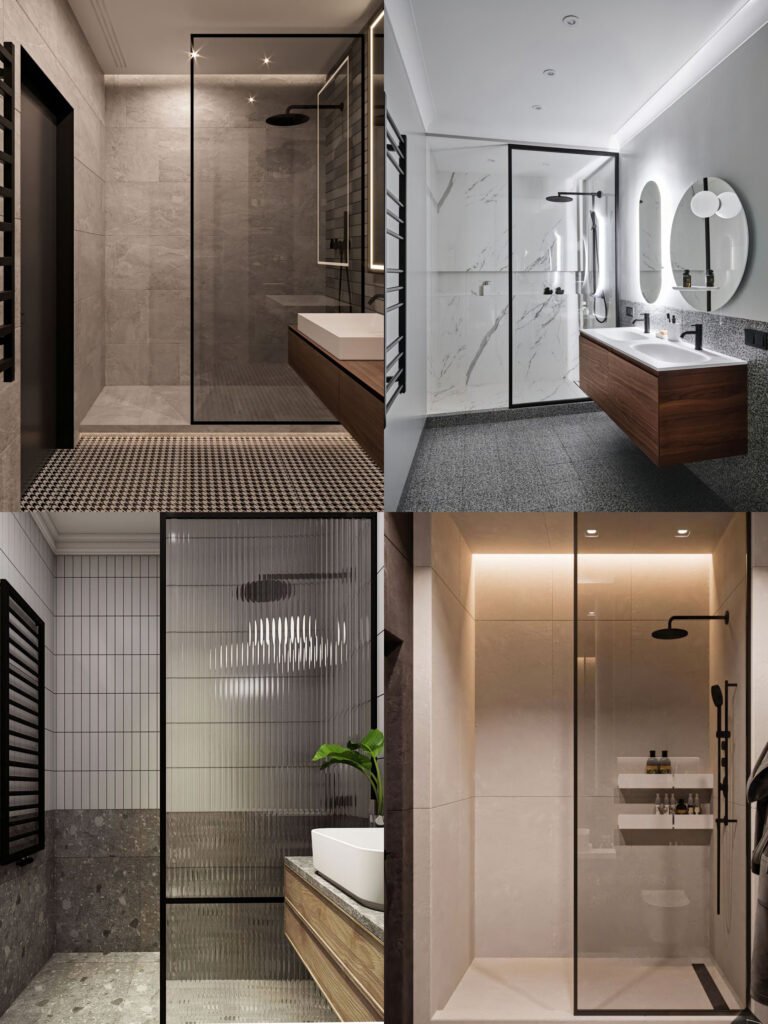The shower area is an essential part of our daily life, not only serving as a space to start and end the day but also as a place to relax and relieve stress. To enhance the comfort and functionality of the bathroom, the design must not only focus on aesthetics but also on practicality. As a crucial component of the bathroom, the choice of Shower Doors is especially important. With so many options available in the market, choosing the most suitable one can be quite challenging.

1. Shower Door Types
- Sliding Doors: Ideal for smaller bathrooms, saving space as they do not require extra room to open. Perfect for modern bathroom designs.
- Swing Doors: Suitable for larger bathrooms, similar to traditional doors, providing more space for entry and exit.
- Folding Doors: Similar to sliding doors, but they fold up, making them a good option for bathrooms with limited space.
- Frameless Shower Doors: Offering a sleek, modern design, perfect for bathrooms with a minimalist and stylish aesthetic. Easier to clean and offers a transparent look.
- Framed Shower Doors: Usually made with aluminum or steel frames, ideal for more classic or traditional bathroom styles.
2. Size and Space
- Bathroom Size: When choosing a shower door, consider the actual size of your bathroom to ensure the door doesn’t take up too much space. Sliding doors or folding doors are great for smaller bathrooms, while swing doors work well for larger spaces.
- Door Dimensions: Make sure the shower door’s dimensions fit the shower area, ensuring the height and width are appropriate for ease of use and proper operation.
3. Materials and Durability
- Glass Material: Common glass types for shower doors include tempered glass and reinforced glass. Tempered glass offers higher durability and safety, reducing the risk of breakage.
- Frame Material: Shower door frames are usually made from aluminum, stainless steel, or other corrosion-resistant materials. Choosing durable materials can prolong the lifespan of the door.
- Glass Thickness: The thickness of the glass affects both the stability and aesthetic of the door. Typically, 8-10mm thick glass is commonly used.
4. Aesthetics and Style
- Style Matching: The style of the shower door should complement the overall bathroom design. For modern bathrooms, frameless or minimalist shower doors are ideal; for more traditional bathrooms, framed or decorative doors may be better suited.
- Clear vs. Frosted Glass: Clear glass makes the bathroom look more open, while frosted glass provides better privacy and reduces water spots.
- Color and Coating: The door frame can come in various colors, such as silver, black, or gold, and should be chosen to match the bathroom’s overall decor.
5. Opening Mechanism and Ease of Operation
- Sliding Mechanism: For sliding doors, ensure the sliding track operates smoothly, and the door opens easily. Tracks should be made from corrosion-resistant materials to avoid rust caused by water vapor.
- Handle Design: The handle should be both stylish and practical. Many shower doors feature simple pull handles or knobs, but they should be designed to prevent sliding or scratching.
6. Water Tightness and Waterproofing
- Seals: Good seals around the door edges are necessary to prevent water from spilling out. High-quality seals effectively prevent water from splashing outside the shower area.
- Water Flow Direction: Ensure that the door is positioned in a way that prevents water from affecting other areas of the bathroom, and plan the opening direction properly to avoid water spillage.
7. Cleaning and Maintenance
- Easy-to-Clean Surfaces: Choose shower doors with glass or coatings that are designed to be waterproof and resistant to water spots, making cleaning easier.
- Anti-Stain Coatings: Many modern shower doors come with anti-stain coatings, such as water-repellent glass, that reduce the buildup of soap scum and water stains, simplifying maintenance.
8. Budget
- Price Range: Choose a shower door that fits your budget. Higher-priced shower doors usually offer better quality and more features, such as enhanced durability and better water sealing.
9. Safety
Door Edge Design: Some shower doors have rounded edges to avoid sharp corners, improving safety and preventing injury.
Glass Safety: Ensure that the shower door is made with safety-tempered glass that complies with safety standards, reducing the risk of injury in the event of breakage.
